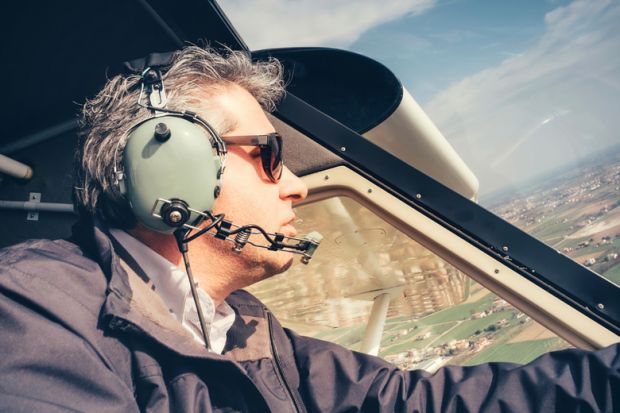This book is about more than recreational aviators: it is an analysis of the culture of private flying in the US – as distinguished from commercial, corporate and military aviation – in the four decades after the Second World War. Alan Meyer tells us about the masculinity of this sector, and thoroughly explores the complex and multifaceted reasons for this exclusionary orientation.
As Meyer points out, although the war produced thousands of pilots – men and women – there was not the peacetime surge in private flyers that one might have expected. Many came home simply wanting to leave the war behind, and flying took them back to the combat cockpit. Moreover, available civilian aircraft were boring to fly compared with the high-performance aircraft of wartime, and even with the G.I. Bill and other programmes, aviation was an expensive hobby. The promise of “an aircraft in every garage” never quite worked out.
Even the newer, safer aircraft designs did not help; they were seen as lacking skill and masculine prowess to operate. First was the Ercoupe, a small single-engine aircraft that took away some of the control challenges, was difficult to aerodynamically stall, and was easy to steer on the ground. It also had “tricycle” landing gear, with two main and one nose gear, a departure from the “tail dragger” design of earlier civilian light aircraft. As Meyer recounts, the ease of flying the Ercoupe was demonstrated when the untrained wife of a pilot accidentally pushed the throttle forward, took off and, instead of panicking, used her time in the air to figure out how to fly it and safely land it.
The ease of operation of the Ercoupe caused one man to observe: “The mystery of the air and glamour of flying were disappearing over the horizon…it’s getting too simple.” This same attitude handicapped the Cessna Skymaster, a twin-engine aircraft with the engines aligned along the centreline of the fuselage – one in front pulling and the other in the back pushing. This eliminated the dangerous pulling to one side when an engine was lost that could be especially hazardous at take-off. The Skymaster had better single-engine performance than many other light twins of its day, and was even used as a combat spotter aircraft (the OV-02) by the US Air Force in Vietnam – complete with weapons. But it never caught on.
For many reasons given by Meyer, women stayed away from this macho environment. First, there was the widespread view that women could not be good pilots – in spite of the contrary evidence of the successful Women Airforce Service Pilots (Wasps) of the Second World War. Flight instructors were especially hard on any woman brave enough to take flight lessons. Then there was the resolutely masculine culture, likely to give an icy reception even to uninitiated males who ventured into the bastions of maleness known as the local airport. Going to the airport to spend time with the guys, engaging in the manly pursuit of flying, and jawing about aviation (hangar talk) were seen as a man’s means to escape the stresses of home and work, similar to golf, poker and fishing. But one can only guess that it was not only the male member of the couple that welcomed this respite.
James T. Crouse is adjunct professor of aviation law, Duke Law School, a former US Army test pilot, and author of the forthcoming thriller Broken Eagle.
Weekend Pilots: Technology, Masculinity and Private Aviation in Postwar America
By Alan Meyer
Johns Hopkins University Press, 328pp, £29.00
ISBN 9781421418582
Published 29 January 2016
POSTSCRIPT:
Print headline: Hanging with the boys in hangars
Register to continue
Why register?
- Registration is free and only takes a moment
- Once registered, you can read 3 articles a month
- Sign up for our newsletter
Subscribe
Or subscribe for unlimited access to:
- Unlimited access to news, views, insights & reviews
- Digital editions
- Digital access to THE’s university and college rankings analysis
Already registered or a current subscriber?




